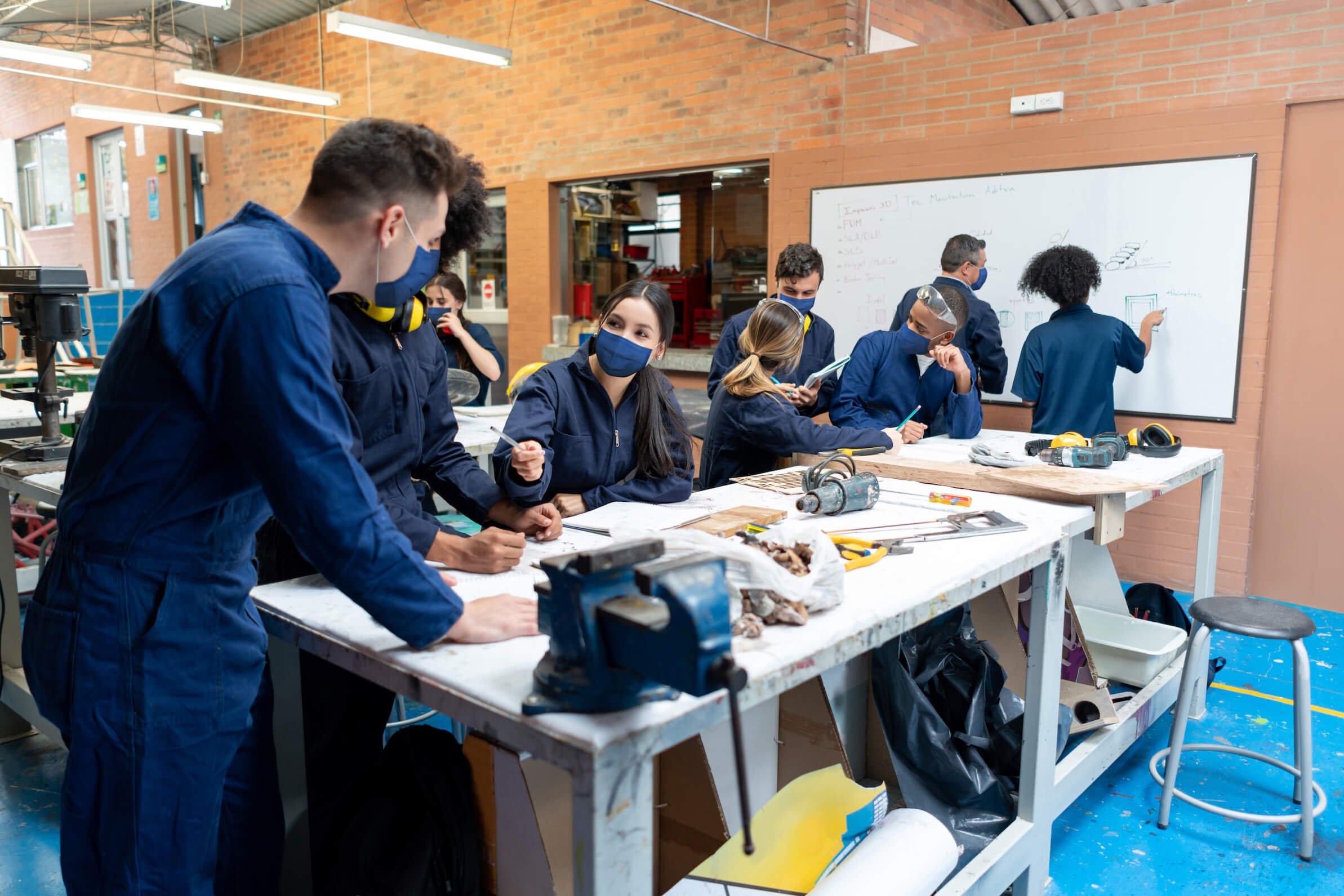The 2021 TPrize Challenge received more than 200 applications from 34 countries. Teams led by women comprised 44% of the proposals.
As a result of the Covid-19 pandemic, over 165 million students were out of school and over 26 million jobs were lost in the Latin America and Caribbean (LAC) region. Covid-19 also amplified LAC’s existing inequities across socioeconomic status, age, geography, race and ethnicity, digital access, and gender. In fact, job loss in the LAC region has disproportionately affected women and has increased inequities for informal workers (who make up 60 percent of LAC active workers), youth, lower-skilled workers, people with disabilities, and Indigenous peoples.
While the pandemic has shown successful models of how remote learning and work can help to level the playing field, flexible education and training will need to be further prioritized to provide people across the LAC region with quality learning and employment opportunities. To close the skills gap, infrastructure and innovation will be top of mind, including broadening access and opportunities for remote learning and training. As we prepare for a post-Covid world, people across the region must be equipped with the capabilities, skills, and lifelong learning opportunities to prosper in the work of the future. Now more than ever, solutions are needed to drive innovation and leverage technology to develop people’s potential to learn and obtain good jobs.
With this in mind, on June 10, 2021, Tec de Monterrey and the University of the Andes, with the support of MIT Solve, launched the call for the TPrize. This award seeks to promote entrepreneurs who generate solutions to social and educational problems in Latin America and the Caribbean. The TPrize 2021 Challenge was to resolve the following question:
How can under-resourced populations across Latin America and the Caribbean develop the necessary skills to access good jobs, better opportunities, and overall well-being?
With this challenge, the TPrize sought technological solutions and support to develop skills, create opportunities, and promote community well-being in Latin America and the Caribbean. Four months after the start of the call and the analysis of more than 200 applications from 34 countries, we announce the ten finalists of the TPrize 2021 Challenge.
The Ten Finalists of the TPrize 2021 Challenge
1. MIDE – App for RURAL SCHOOLS | Ricardo Mansilla Chávez (Chile)
2. Wiixii | Jessica Hammer and Cindy Weitzman (Guatemala)
3. JovenSalud (YoungHealth)| Adriana Gómez (Costa Rica, Nicaragua)
4. O-lab: Empowering Indigenous Learners | Tania Rosas (Colombia)
5. ChatClass | Jan Krutzinna (Brazil)
6. Musa | Monica Ramos Li (Peru)
7. EducALL: Calls for Education | Daniel Garavito (Colombia)
8. Voices Of Venezuela | Jason Rovig (Colombia)
9. T-share | Melania Sanhueza (Chile)
10. A prender la Onda (To ignite the WAVE)| Bárbara Uribe (Colombia)
Get to know the finalist projects
MIDE
The current pandemic has demonstrated that the continuity of education is a complex and permanent challenge for all schools worldwide. According to UNESCO, more than 1.5 billion children and young people have had to stop attending school. In this context, RURAL SCHOOLS experience more difficulties than urban ones because many have insufficient infrastructure and connectivity; they are also “little attended” by educational technology companies.
Therefore, MIDE offers rural schools an asynchronous app that allows their students to study offline using their mobile phones or tablets at home, even in places without internet access. It minimizes the problem of connectivity and maximizes the leverage of massively used devices such as phones. MIDE is an educational app with many online software features but only requires sporadic connections.
Wiixii
We are committed to helping Latin America’s most disadvantaged children achieve a comfortable relationship with math, learn basic problem-solving skills, and develop a positive growth mindset. By delivering our content through WhatsApp, we solve the access problem and bring engaging mathematical enrichment to underserved populations through challenging game-based content.
We focus on improving students’ self-esteem and educating participants and their parents about the significance of mentality and metacognition. Our math challenges and DIY math games develop new habits of the mind, critical thinking skills, ingenuity, and the ability to solve open problems creatively. Our ultimate goal is to challenge students to view themselves as lifelong learners who can successfully solve problems in whatever domain they wish to pursue. If scaled globally, our products will decrease the number of underrepresented students by motivating and supporting them to stay in school, including high school.
JovenSalud
There are 70 million young people in Central America and Mexico alone. They comprise approximately 40% of the population. A large proportion of them is marginalized from economic, political, and social processes. Twenty-five percent has been left out of both the educational system and the formal workplace.
With 15 years of experience, TeenSmart International’s (TSI) JovenSalud.net educational platform has 24/7 online services and is the leading online health and personal skills promotion resource for adolescents in the Region. It has served 80,000 Latin American adolescents. The demand continues to grow as JovenSalud effectively provides a safe space, empathetic listening, and specific advice for personal strengthening, emotional health, continuing study, and insertion into the labor force. These services have reached only 1% of the population. Can you imagine the benefits if all adolescents had free 24/7 assistance for their personal strengthening?
O-lab: Empowering Indigenous Learners
The Origen Foundation is an NGO that aims to eradicate the distressing opportunity gap faced by underrepresented communities by providing accessible and inclusive digital learning. Our project works through partnerships with communities to reach young people and provide them with the necessary support to continue their education. To achieve this goal, we have developed O-lab, the learning app that bridges the digital divide. It works offline on low-cost devices and has a virtual assistant that translates educational content into indigenous languages.
The Origen Foundation empowers young people to become leaders in their communities. It provides complementary education, STEAM, and entrepreneurship courses co-created with quality educational institutions to give young people access to quality education, increase their skills for the future, and develop projects for their communities. Maintaining ongoing dialogue and training in the communities where we implement O-lab, we work to wipe out digital illiteracy and guide young students to develop twenty-first-century skills to thrive.
Chatclass
ChatClass is committed to closing the enormous global skills gap through engaging, quality corporate training. We focus on the workforce without desks: 2.8 billion people who do not sit at a desk to do their jobs. Our solution is a complete and automated conversational learning platform. Users access interactive courses via WhatsApp with text and voice messaging, student grading, and social learning opportunities. Managers can track their progress and results using dashboards to analyze all the data we compile and filter. In 2020, Facebook recognized ChatClass as the only global success story for education through WhatsApp.
If scaled globally, we could offer quality education to billions of people who work outside the office and are not assisted by conventional training programs. The solution will improve outcomes and worker participation rates and also lead to future economic opportunities.
Musa
Musa addresses the urgent need to improve and retrain the Latin American workforce equitably, including people with limited access to computers and internet connectivity. Musa’s team transforms an organization’s training content into a microlearning format and facilitates its delivery through a WhatsApp chatbot, which users can access from anywhere at their own pace.
Musa helps organizations train their employees and other interested parties, such as customers, suppliers, and beneficiaries, remotely, quickly (with 15-minute learning units), and effectively (9 out of 10 finish Musa micro-courses). Users experience a low learning curve with an app familiar to them (WhatsApp). All this makes training less costly than traditional solutions, adding value to the productive ecosystem. The average annual training cost per employee was $1,286 (Industry Training Report, 2019).
EducALL: Calls for Education
Half of the children in developing countries before the pandemic did not have access to the internet or high-tech devices to access their education. The pandemic aggravated this situation.
Can you imagine the future potential of humanity without barriers to access education?
With EducALL technology, this access is possible. We offer the first distance learning platform that does not need the internet, just a telephone line that allows access to education with a simple call. EducALL is like having an audio platform, an educational Spotify, a learning management system (LMS) like Moodle, voice internet (Google assistant, Wikipedia, translator), Artificial Intelligence, and all the benefits of education using basic cell phones. We are the cost-effective solution to close the worldwide information access gaps because we use established phone networks and cell phones that are being discarded.
Voices of Venezuela
Vulnerable communities lack access to the information and infrastructure needed to integrate into the formal economy. We integrate low-adoption-barrier solutions by connecting educational media and helplines on social media and messaging platforms that include free data in mobile plans. The educational content consists of the social skills needed to apply for jobs, start businesses, access continuing education or training programs, compose resumes, and prepare for job interviews.
Network data supports monitoring accessibility issues and diagnosing service gaps while connecting users to available educational services. This model can be replicated for additional populations. As our information resources database grows and our models develop, more overlap among communities allows us to scale to an AI-based recommendation system that covers a broad knowledge base of available resources and processes. Globally, this could provide guided information and orientation to millions of people seeking education and opportunities.
T-Share
T-share is a social collaboration platform where teachers can easily find engaging planning lessons and pedagogical resources shared by colleagues who have successfully motivated their students in their learning process; thus, other teachers can replicate their impact. If T-share scales to a global level, professors will have access to content from top teachers worldwide, making it easier for them to adapt and update their classes to meet students’ needs and promote fundamental changes in education.
A prender Onda
We are a collective and voluntary process born to give continuity to education, even in times of crisis. In Colombia, where emergencies are constant, many people do not have access to formal education. For this reason, we create and strengthen alternative and community learning experiences through a flexible education methodology, which seeks to sustain itself locally and function systematically. We believe that learning cannot depend on formal education spaces and the internet. We promote that the environment is the classroom where educational processes happen daily. Therefore, we co-create educational podcasts on community stations with teachers and students, and we train local “change agents” to lead popular educational spaces. By scaling this model, many communities would have the possibility of autonomous learning and the tools to build and share their knowledge.
The TPrize 2021 Challenge Grand Finale will take place on December 13, 2021. For more information on the finalists and the TPrize 2021 Challenge, visit: http://tprize.mx/
Translation by Daniel Wetta.
This article from Observatory of the Institute for the Future of Education may be shared under the terms of the license CC BY-NC-SA 4.0 
)
)


)